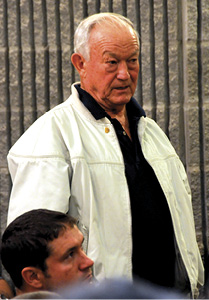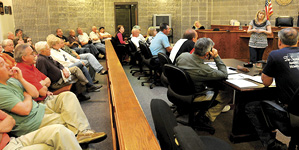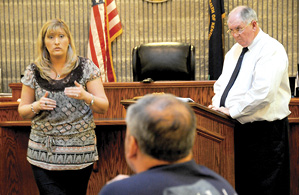Questions asked, opinions differ at public hearing
“Will the Clinton County Jail close?”
That’s a question yet to be officially answered. However, the public had the opportunity to voice their opinions, concerns and ask questions at a public meeting last Friday night, May 3.
The session, hosted by Clinton County Fiscal Court, saw well over 30 people come out on an overcast weekend night to the courthouse to state their opinions and ask questions of court members.
The one hour and 20-minute session saw well over 20 of those on hand either make presentations, voice comments or ask questions–not only about the proposal to close the jail, but about the county’s financial condition in general. The meeting saw several exchanges among fiscal court members and those who chose to speak or ask questions.
Since the fiscal court was in an official meeting, it was conducted as such, with the session being opened with the Pledge of Allegiance and prayer. Afterwards, Judge/Executive Lyle Huff explained the meeting format to those in attendance.
Deputy County Clerk Kate Parrish acted as time-keeper as well as keeping a list of names of individuals who addressed the court during the comment period–each with a five-minute time limit. However, as the meeting progressed, audience members made comments from their seats and asked court members questions on an array of issues.
The first person to speak was Angie Capps, a public defender and former Cumberland County Attorney from Burkesville, who was one of the majority at the meeting who favored keeping the jail open.
Capps discussed associated costs the county would still incur even if the jail were closed, primarily in the area of transporting inmates and the liability associated with it, as well as medical related costs to the county even when those prisoners are housed in out-of-county facilities.
Cumberland County’s jail has been closed for the past few years and the attorney noted they faced the aforementioned problems. She also said that in instances where multiple inmates are involved and/or have to be in court on a certain day, transportation officers may be running “back and forth all over the state.”
“I don’t think you’ll save as much money as you think,” Capps added during her address to the court, asking them to weigh and consider the options.
Capps’ address led to the first exchange of the meeting when Magistrate Mickey Riddle began posing some questions, including saying the county already has the liability for its inmates and that some magistrates from Burkesville had told him that having the jail in Cumberland County had saved that county money.
The magistrate went on to say that other counties, such as Casey or Wayne, had submitted proposals that showed savings about the approximate $600,000 annually the county now spends on the jail budget and added that an official with the Department of Corrections had recently suggested to the court that seven current part-time employees at the jail should actually be full time, adding that would also add to the local jail budget.
Capps then replied that there are both male and female inmates that have to be transported, meaning transportation officers of both sex and that a contract with another jail doesn’t mean that jail has to accept certain inmates.
At one point there was also a disagreement between Capps and Riddle as to whether the jailer–in the situation the jail is closed–would have to provide transportation. Capps said according to statute that a jailer would only be responsible for either being a custodian of property or a court bailiff, saying the statutes say the county “may” not “shall” compel him to be in charge of transporting inmates. Magistrate Riddle, however, after discussing the issue with a Department of Local Government official recently, differed with that opinion.
At one point Capps asked, “If you have no jail and no one to transport, what are you going to do?”
Before Capps’ presentation ended, Magistrate Ricky Craig said the only way to keep the jail open is to “cut many, many things.”
Capps concluded by adding that Clinton County is facing the same issues that many other counties in Kentucky are currently facing.
Johnny Russell, a former jail employee who worked there in the 1990s, then addressed the court on the issue and said there would be problems whether the jail is open or closed. He cited situations where other jails may not accept certain local inmates and where two inmates may have to be transported at the same time, but under certain circumstances, separately.
“We all have kids and grandkids,” Russell said. If a teenager is arrested and has to be taken somewhere else, it is a burden on their families to go to other counties to make bail or visit. He also noted that male and female prisoners could not be transported simultaneously.
Magistrate Craig countered that someone being put in jail “isn’t our responsibility.”
Russell County Jailer Bobby Dunbar, who did not give an opinion either way on the closing issue, told the court that Russell County would be interested in housing inmates from Clinton County if they chose to close the facility and said they would make a bid, but added he also understands and has experienced the responsibilities of being a jailer when a jail was closed–as was the case with Russell County when he was first elected a few years ago.
Dunbar told the court that it would be a “major undertaking” if the jail were closed but added he would submit a bid on housing local inmates if the court chose to do so. He also said the Russell jail budget was $600,000 when it was opened (prior to closing) and $800,000 the year it was closed, the year he first took office.
Dunbar said he kept the transportation going and people on payroll during that time and averaged anywhere from one up to six or seven transports a day. Currently, Russell County has a new jail that now also can house state inmates.
Magistrate Terry Buster then posed some questions to Dunbar, such as if he allowed inmates to make phone calls when first booked in, which Dunbar answered “yes.”
Cumberland County Judge/Executive John Phelps was the next to address the court, and in so doing, also made something of a proposal. He first said most counties were “screaming the same thing,” and added the situation would be tough regardless if the jail were open or closed.
Phelps said housing for inmates from Cumberland County, at a current average of 12 per day, was around $300,000 annually and transportation costs around $40,000, not counting medical and other expenses with his county jail closed. He said that of all jails in the state, “maybe 10 counties stay in the black.”
Phelps added he was not opposed to having a cost analysis, or feasibility study done–jointly–with Clinton County on the possibility of having a two-county facility to house inmates from both.
Magistrate Riddle said that currently the state isn’t funding any new jails or justice centers. However, after Phelps’ presentation, court members agreed it would be feasible to have such a cost study done for a joint facility.
Phelps, who is currently in his first term as Cumberland County Judge/Executive, did tell the court that since he has been in office, their county did have to do a tax increase. He also said Cumberland County’s jailer is in charge of inmate transportation with about five officers to handle the transports.
Eddie Littrell then addressed two magistrates, Riddle and Patty Guinn, first asking Riddle why he wanted to close the jail. That question led to an overview of past happenings the magistrate said had occurred that led up to the current jail and financial situation.
In brief, Riddle said his reasons were to create money to keep from borrowing money or raising taxes. He said in the past couple of years, the county has had to borrow and pay back money, borrow and pay back from the road fund (which is a restricted fund and has to be repaid from the general fund if borrowed) and said that during the time, several additional people had been hired.
Riddle continued that at one point a state official had come in and told the court to balance its budget so they (court) decided to cut. He also said that the judge/executive had recommended cutting the sheriff’s and county clerk’s offices during that time, but each indicated they would have to close if they were cut.
Riddle also mentioned the court didn’t act on a proposal to make the ambulance service a taxing district and addressed other areas of spending he felt unnecessary, such as funds to the park board, saying the county couldn’t keep giving money away. “We either cut the budget, close the jail or raise taxes,” he said.
Littrell also made the statement that the county couldn’t run on a 2000 budget without taxes and also questioned the cost of health insurance for employees and why that wasn’t cut instead.
During the exchange, Magistrate Patty Guinn publicly stated that she was not for closing the jail and thinks it should stay in Clinton County.
Magistrate Hershell Key, in discussions related to taking jail business out of the county, said Clinton County already sends $70,000 a year to house juveniles in other counties.
Magistrate Buster added there were certain funds that could only be used in certain areas, state mandated revenue.
There was then a discussion on possible taxes that may be levied to help with the financial situation and one person from the audience suggested a wheel tax.
However, Judge Huff noted that a county could not legally impose a wheel tax, adding the only legal taxes they could levy, other than taxing districts, is property, occupational, and vehicle insurance premium taxes. He said a city can do a wheel tax in Kentucky if it chooses.
Another question was asked as to why the city can’t pay any on the jail. That answer is because state law mandates county governments to operate and maintain county jails.
Jailer Dunbar then suggested to the court they may consider a “sunset” clause to the current occupational tax, as was the case in Russell County recently, when they raised their occupational tax rate with the sunset clause attached to allow the rate to be revisited and reduced after a two-year period.
Dunbar said that in the time the tax was added under the sunset clause in Russell County, the county generated enough revenue to operate in the black and still reduce the occupational tax a little bit after the first two-year period. He said the added tax over that sunset clause period helped bring the county back to level ground.
Magistrate Craig said the only problem with the occupational tax is that is has a lot of flaws, with a lot of people not paying their share.
Clinton County Jailer Gene Ferrill asked how much local money would be spent out of the county if the jail closes, since money spent on the local facility is recycled in the community. He also questioned the impact of closing the jail might have on local business.
The jailer went on to discuss previously debated issues such as inmate transportation costs, contract costs with other jails, medical expenses, and so forth. When he asked how long a contract the county could get with another facility, the answer was one year at a time.
Judge Huff inferred during that portion of the discussion that by closing the jail, Clinton County would be supporting services in other counties.
Ferrill noted that at times there have been up to over 40 inmates at one time and expects that with water levels on Lake Cumberland to be raised this summer and the expected increase in tourism traffic, there will likely be more inmates to deal with.
The local jail is an 18-bed facility and Ferrill said they could hold up to around 22 with any amounts much higher than that having to be taken to other facilities.
Clyde Stearns, a current jail employee who also works other jobs, said he would be willing to pay more taxes than have the jail leave Clinton County. “We are about keeping money at home but now we want it to go to Russell County or Monticello,” he said.
Gilbert “Gib” Beaty injected that when a person is living on a fixed income, it’s hard for them to pay taxes.
Larry Kempton questioned the court, “if Russell County and others can do it (contract rate) for this amount, why can’t we?”
Judge Huff again read some statistics comparing jail inmate populations and associated costs in 2003 compared to 2011, again noting that per inmate expense based on the growth in number has gone down, saying “you can’t say he (Jailer Ferrill) isn’t managing the jail well.”
Another resident stated that “crime isn’t going to go down,” and said the court should think about building a bigger jail that could house state inmates.
Former Magistrate Jerry Lowhorn, who was serving in 2003, addressed Judge Huff’s previously quoted figures, saying that during that administration, the court kept the jail by cutting back on expenses.
Former Judge/Executive Charlene King then posed a question about medical expenses, asking if an inmate had to be taken to the emergency room whenever there was a problem. Jailer Ferrill noted they were usually taken to Dr. (Wm. C.) Powell’s office, who they are in contract with to provide the medical services.
Jailer Dunbar said that Russell County Detention Center contracts its medical services out, but it was noted the (Clinton) county would still be responsible for their own county inmates expense.
Magistrate Riddle said Casey County had offered to cover medical, except in life-threatening conditions.
Beaty then asked the court how they were going to pay the road fund back the money borrowed from it. Judge Huff answered that the county expected to have some revenue coming in by the end of the fiscal year to cover it.
Other issues were then touched upon, including Judge Huff noting that from previous discussion, two counties could band together and work for an interlocal agreement to pay for a bond issue if funds were available for construction of a joint Clinton-Cumberland jail.
A brief discussion also ensured on how the state’s push for early inmate release due to prison overcrowding has affected the entire mix.
At one point there was a differing of opinions on the status of the county when the jail was first closed in the 1990s.
Jailer Ferrill said the jail had been closed once before and asked “wasn’t it a nightmare?” on the county.
Former Judge King, who was in office when the jail closed, said “no.” She later said that when the jail closed in the 90s, magistrates went against her and reopened it. “I told them then you’re going to have to raise taxes to keep it open.”
Ferrill continued to reiterate that the families of inmates was a primary concern if the local jail closes. When they (inmates) do get put in jail, families are after all of us, he added.
Magistrate Craig replied, “That is part of it.”
The jailer added, when you vote to close it, magistrates will still be here, adding other jailers are saying they would be making a mistake.
One question was posed as “how did it get in this shape in the first place?”
Judge Huff responded that question had been answered before, saying that in 2008, (with the recession) we hit a wall when the economy fell. He said costs have continually gone up while incomes have stayed the same.
Another person asked about donations to the library and was told the court ceased giving funds to the library a couple of years ago since they are their own taxing district.
Littrell also questioned funding to the park, asking why can’t they charge (admission) for ball games?
Although that question went unanswered, under Little League rules and the fact the park is a county owned public facility, admission fees to the public cannot be charged.
Another member from the audience said that if inmates have to go out of town to be jailed, it may give some criminals less incentive to commit crime.
When Stearns asked the question how long it had been since taxes in the county had been raised, County Treasurer Dallas Sidwell noted that property tax rates were raised only to the minimum allowed and is now at sic percent. It was also stated by Littrell that Clinton County has among the lowest tax rates of anycounty in the state in Kentucky.
A final question came about whether or not deputies may have to transport prisoners. Judge Huff said that if the jail closed, the court would have to develop a transportation plan to put in place.
The session was then adjourned and no actions were called to be taken. The meeting was for the sole purpose of comments and questions pertaining to the jail closing issue.
Any formal vote on whether or not to close the jail will be forthcoming and may again be discussed at the next regular meeting of Clinton Fiscal Court, along with the proposed 2013-14 fiscal year budget. That meeting is scheduled for next Thursday, May 16 at 5 p.m. and is open to the general public.



Several concerned citizens attended last week’s public comment hearing held during a fiscal court meeting to address the possible closing of the Clinton County Jail. Angie Capps, a public defender from Burkesville and the former Cumberland County Attorney, is shown above addressing the issue from her experiences and perspective, as Clinton County Judge Executive Lyle Huff, right, and Clinton Magistrate Mickey Riddle, center, listen. Clinton County Jailer Gene Ferrill, shown in the small photo at left, addressed several issues during Friday night’s hearing.



